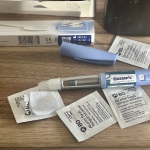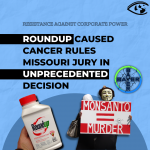USA: Hormone Replacement Only the Tip of the Iceberg
The HRT (Hormone Replacement Therapy) scandal is bigger than most
think. It's not just about menopausal women, like me, getting bad information from their physicians and the pharmaceutical industry for over 40 years, while the federal government stood by and did nothing. The scandal is much bigger than that.
We're living in a world awash in hormones. Last March the USGS (United States Geological Survey) reported that " pharmaceuticals, hormones, and other organic wastewater-related chemicals have been detected at very low concentrations in streams across the nation. Many of the chemicals examined (81 of 95) do not have drinking-water standards or health advisories." Ironically, hormones do more damage at low levels of exposure
than at high levels.
More disturbing news came from Great Britain. According to British scientists, synthetic hormones from contraceptives and HRT are affecting the reproductive organs of male fish. Male fish are developing female characteristics, including reproductive organs. The five-year study of ten rivers in England by the Environment Agency reported that 50 percent of male fish had developed eggs in their testes or female reproductive ducts, 10
percent of the fish were sterile, and 25 percent were producing damaged sperm.
For the last 50 years researchers around the world have documented the growing and insidious impact of hormones on people and the environment. Excessive exposure to hormones, both synthetic and natural, are affecting every living thing -- humans, animals, fish, and even plants.
Physicians are prescribing hormones to millions of men, women, and children. Farmers are giving hormones to their livestock, including farmed fish. Hormones are in our food and many of the products we use everyday. Synthetic hormones, which interfere with our natural hormones, can leach out of an endless variety of products: plastics, beauty and personal care products, household cleaners, lawn and garden chemicals, dental sealants ... almost anything involving petrochemicals.
Yet, few hormones have ever been thoroughly or independently tested for their impact on public health and the environment. And the cumulative impact of many different hormones -- male and female, natural and synthetic -- is not even being considered for study by industry or government.
Cynthia Pearson, Executive Director of the National Women's Health Network, isn't surprised. She says, "Pharmaceutical companies control what studies get funded, who gets paid for doing them, where (and whether or not) those studies are published, and how the studies are interpreted."
The HRT study got launched mainly through the determined efforts of Dr. Bernadine Healy, the National Institute of Health's first female director. But insiders say that, due to the hard ball lobbying tactics of the pharmaceutical industry, the study was limited to only two hormones, estrogen and progestin. Already, the industry is pushing alternative drug therapies that most assuredly have not gone through the somewhat rigorous testing of the HRT study.
And contrary to media reports that blame women for the widespread use ofHRT, that accuse women of flocking to their doctors, clamoring to remain young forever, demanding hormones ... that was neither my experience nor the experience of women I've talked with. Instead, it seems that most doctors made their female patients feel like tree-hugging nut cases if they didn't go on HRT.
Now I, like many other menopausal mavens, am learning to minimize my symptoms through simple changes in my diet -- no thanks to our doctors. The mainstream medical community is totally unprepared to do anything in concert with nature. They are held hostage by the pharmaceutical industry. Under their systemically violates its own ethic, first "do no harm." It is now clear that "harm" is just what they've been doing through the widespread use of poorly tested hormones.
And what is the extent of the "harm" done? Dr. Theo Colborn and her co-authors of "Our Stolen Future" say that the known risks of
over-exposure to synthetic hormones are: lower sperm count, prostate problems, reproductive problems in women (including miscarriages, tubal pregnancies, endometriosis, and breast cancer), and effects on intelligence, behavior, development, and disease resistance. Some health experts believe that human exposure to the Bovine Growth Hormone (BGH) present in meat and dairy products could be at the heart of the current epidemic in
obesity.
As for which institution is most responsible for a world awash in hormones, I blame the federal government for failure to do its duty - to protect public health and the environment. Instead, they routinely give the green light to, if not pave the way for, those in business who want to make the big bucks, no matter who or what gets hurt. The HRT study was an exception to the rule.
Now that menopausal women know that we were lied to for at least 40 years, all I can say is: hell hath no fury ...
Lynn Landes is a freelance journalist specializing in environmental issues. She is the founder of Zero Waste America, a Web-based environmental organization, and posts her work on EcoTalk.org.
- 122 Pharmaceuticals



